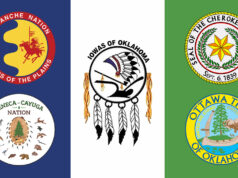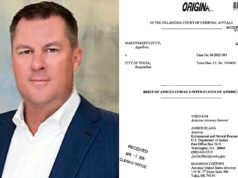
Officials from the state of Oklahoma and the U.S. Department of the Interior are awaiting a ruling from a federal district court judge regarding which agency has regulatory authority over surface mining and reclamation operations on affirmed tribal reservation land.
The issue marks the first major court challenge regarding matters of civil jurisdiction in the wake of the landmark U.S. Supreme Court decision in McGirt v. Oklahoma, which functionally affirmed the Indian Country reservations for six sovereign tribal nations in the eastern part of the state. U.S. District Court Judge Stephen P. Friot told NonDoc on Dec. 15 that he expects to rule on the surface mining case in the “near future.”
Held in the U.S. District Court for the Western District of Oklahoma, Dec. 2 arguments between state lawyers and federal attorneys focused on the state’s filing for a preliminary injunction that would block the Interior Department from usurping the state’s regulation of surface mining and reclamation operations.
On May 18, the U.S. Office of Surface Mining Reclamation and Enforcement added a notice to the Federal Registry that prevents the state of Oklahoma from exercising regulatory jurisdiction under the Surface Mining Control and Reclamation Act of 1977 on lands of the Muscogee Nation. The notice transferred that authority to the federal government.
Beyond determining whether to grant the state’s requested injunction, Friot will rule whether the federal government’s action on surface mining jurisdiction violated the Administrative Procedure Act, which governs the process by which federal agencies develop and issue regulations.
Based on an official court transcript (embedded below), the following article provides a recap of the significant Dec. 2 hearing and the briefs regarding the definition of a federal Indian reservation requested that day by the judge.
State focused on City of Sherrill precedent
Ryan Leonard, Oklahoma Gov. Kevin Stitt’s special counsel on tribal jurisdiction issues, opened the Dec. 2 hearing by outlining arguments challenging the SCOTUS ruling in McGirt v. Oklahoma. Friot, a University of Oklahoma graduate who was appointed to the federal bench in 2001, stopped Leonard with a question.
SCOTUS background
The 5-4 McGirt v. Oklahoma ruling in July 2020 affirmed the Muscogee Nation as an Indian Country reservation as defined under 18 U.S.C. 1151a. The Oklahoma Court of Criminal Appeals followed with decisions stating that the SCOTUS ruling also applies to the Cherokee Nation, Choctaw Nation, Chickasaw Nation, Seminole Nation and, most recently, Quapaw Nation.
This means only a tribe and the federal government — not the state — have criminal jurisdiction over major crimes that occur on reservation land involving tribal citizens.
“Have you ever known a federal district judge to overrule the U.S. Supreme Court?” Friot asked.
Leonard replied: “We’re not asking that, your honor.”
Friot then said he wanted to “clear the air.”
“I think the McGirt decision is a disaster for the state of Oklahoma,” the judge said, “but there are other serious issues afoot, as you know.”
Near the end of the hearing, which lasted about two and a half hours, Friot clarified his remark.
“This is a complex matter, and it would be foolish to try and read anything into my questions or comments one way or the other,” Friot said. “And I’ve already cleared the air with one comment on the McGirt decision, as such, but that’s really irrelevant to where this matter goes on the merits. And I want everyone to clearly understand that. It really is irrelevant to where this matter goes on the merits. If McGirt is going to be reviewed and revisited, it’s going to have to be by the Supreme Court or by Congress. And certainly not by this court.”
What Friot’s court will determine, however, is whether a 2005 SCOTUS ruling regarding tribal land in New York provides a limit on the civil jurisdiction scope of the 2020 McGirt decision.
City of Sherrill v. Oneida Indian Nation of New York
Leonard spoke on behalf of the state during the Dec. 2 hearing, arguing that “equitable doctrines” from other cases take precedent on legal questions regarding civil jurisdiction from McGirt v. Oklahoma.
Leonard cited City of Sherrill v. Oneida Indian Nation of New York, a 2005 case about whether the Oneida Nation was part of an Indian reservation and, thus, exempt from local taxation. The Oneida Nation had sold much of its reservation in the early 1800s but reacquired the land almost 200 years later, subsequently claiming it was exempt from local taxes.
In an 8-1 decision, the U.S. Supreme Court ruled that by giving up the land initially — and because regulatory authority had been exercised by state and local governments for nearly 200 years — the Oneidas had “relinquished governmental reigns” and were no longer exempt from state and local taxation authority.
Leonard argued to Friot that the Oneida case applies directly to McGirt v. Oklahoma through a legal doctrine called laches, which says a defendant is not entitled to a claim after an unreasonable amount of time has passed.
“What makes this case subject to the City of Sherrill and the application of the equitable doctrines is the exception identified in the Cayuga Nation case v. Pataki, which says the U.S. government is subject to laches, because here it’s an egregious case, the statute of limitations does not apply, and the federal government is plainly not intervening to protect a sovereign right,” Leonard argued.
Friot then read a section of the Interior Department’s brief, which disputed Leonard’s claim that the doctrines do not apply. Instead, the agency argues, federal statute must be followed.
“Courts of equity can no more disregard statutory and constitutional requirements and provisions than can courts of law… the Court cannot ignore (the Surface Mining Control and Reclamation Act’s) jurisdictional mandate regardless of any equitable and practical concerns asserted by the State,” Friot read from the defendants’ brief.
Leonard argued that the defendant’s brief cited cases that were irrelevant to the question at hand.
“Your Honor, none of those cases involve Indian law,” Leonard said. “Indian law is its own animal, my words.”
Leonard then cited Supreme Court Justice Neil Gorsuch’s majority opinion in McGirt v. Oklahoma, which stated that “many other legal doctrines” exist “to protect those who have reasonably labored under a mistaken understanding of the law.”
“The federal government, since 1977, when SMCRA became law, has been charged with knowing that the Creek Nation Reservation existed, whether it be for the purpose of federal major crimes or otherwise. And so they’re coming in because of the McGirt decision in which the court said two things: A, (the decision is) limited only to the federal major crimes; and B, (there is) no reason to have concern about an unwarranted expansion, those concerns are ‘misplaced.’ That is Justice Gorsuch’s own words,” Leonard said. “The concerns are misplaced, because the state has these obvious equitable defenses that are embodied in the City of Sherrill case.”
Friot offered a different viewpoint of Gorsuch’s opinion.
“And [Gorsuch] also said, in effect, they might or might not work, and if they don’t work, that’s tough,” Friot said. “He basically said that.”
Leonard said he is “more of an optimist.”
“I read the majority decision to say that, you know, that these are going — if this is not a limited decision, we’re going to consider this case by case,” Leonard said. “And this is one of those cases, obviously, Your honor.”
Definition of ‘Indian reservation’ questioned
Attorneys for the state and the U.S. Department of the Interior disagreed over the definition of an Indian reservation. Leonard argued to the court that a large portion of Muscogee Nation land did not fall into the U.S. Department of the Interior’s definition of a federal Indian reservation.
To make his argument, Leonard referenced a definition listed on the Bureau of Indian Affairs’ website.
A federal Indian reservation is an area of land reserved for a tribe or tribes under treaty or other agreement with the United States, executive order, or federal statute or administrative action as permanent tribal homelands, and where the federal government holds title to the land in trust on behalf of the tribe.
Leonard said only a small portion of Muscogee (Creek) Nation land is held in trust meeting the agency’s website definition of a federal Indian reservation.
“Your honor, the problem we have with respect to the Creek lands in question here is that according to the Muscogee Creek Nation’s website, the Creek Nation reservation consists of 7,000 square miles, which equates to roughly 4.5 million acres,” Leonard told Friot. “Of those 4.5 million acres, as of October 2019, 8,148 acres are held in trust. That is less than 1/100 of 1 percent of the Creek Nation reservation recognized in McGirt (that) is held in trust.”
Arwyn Carroll — attorney for the U.S. Department of the Interior — argued that the definition Leonard referenced came from the Bureau of Indian Affairs website and “does not speak to what the definition is under SMCRA.”
“It’s, in any event, language on a website,” Carroll told Friot. “Plaintiffs didn’t raise this argument in their papers, but language on a website doesn’t supersede federal statutory language.”
Friot asked Leonard to have the state submit a supplemental brief regarding the definition of a federal Indian reservation, to which the and U.S. Department of Interior would respond. (Both briefs are embedded below.)
Follow @NonDocMedia on:
Was the Administrative Procedure Act followed?
Attorneys from the state of Oklahoma also argued that the federal government violated the Administrative Procedure Act by making a final agency decision without conducting a judicial review of the surface mining jurisdiction change.
Elbert Lin — former solicitor general of West Virginia — argued on behalf of the state that the “Office of Surface Mining Reclamation and Enforcement’s decision making fails the APA’s requirements for reasoned decision making,” as the agency did not allow the state to comment on the May 18 notice in the Federal Registry.
Friot asked Carroll, the Interior Department’s attorney, why the federal government opted against offering a comment period about surface mining jurisdiction.
“What would have been wrong with a notice — with issuing a notice and an opportunity for comment, so that if the state had anything to talk about under Sherrill or otherwise, that could have been submitted and considered, then you would have a — certainly a much more bulletproof record,” Friot asked Carroll. “What would have been wrong with that?”
Carroll argued that the Office of Surface Mining is “bound by the text of SMCRA and by the decision in McGirt recognizing the reservation.”
Under U.S. Code Title 5, Section 701, there are only two exceptions to judicial review under the Administrative Procedure Act: when “statutes preclude judicial review; or agency action is committed to agency discretion by law.”
Carroll told Friot that the surface mining jurisdiction change was made by the SCOTUS ruling in McGirt v. Oklahoma, not the federal agency, meaning the change was not subject to a judicial review. Friot offered a follow-up question.
“Is an agency decision reviewable under the APA if the agency erroneously concludes that the relevant statutory language is mandatory and unequivocal?” Friot asked Carroll.
Carroll reiterated her argument.
“Agency actions are presumed to be reviewable, that’s basic APA law,” Carroll told Friot. “But, again, our argument isn’t that — and this isn’t, I think, probably going to satisfy you — but our argument is that this isn’t an agency action. This didn’t require interpretation by the agency. The agency didn’t have to interpret the language of SMCRA or apply the language of SMCRA to the McGirt decision. It didn’t need to make any decision about whether it has jurisdiction or not because that jurisdiction transferred as a matter of law.”
Friot told state and federal attorneys that he would attempt to rule on the surface mining jurisdiction question “without delay.”
“If anybody came here this afternoon thinking that you would hear a ruling from the bench, you are going to be disappointed,” Friot said. “This is a matter involving some urgency, really from the perspectives of both sides, and both sides need to have whatever degree of certainty I can lend to the situation. So I do plan to rule without delay and certainly without avoidable delay.”
Transcript of surface mining jurisdiction hearing
 Loading...
Loading...
State of Oklahoma supplemental brief
 Loading...
Loading...
U.S. Department of Interior supplemental brief
